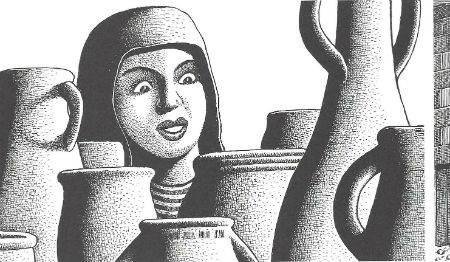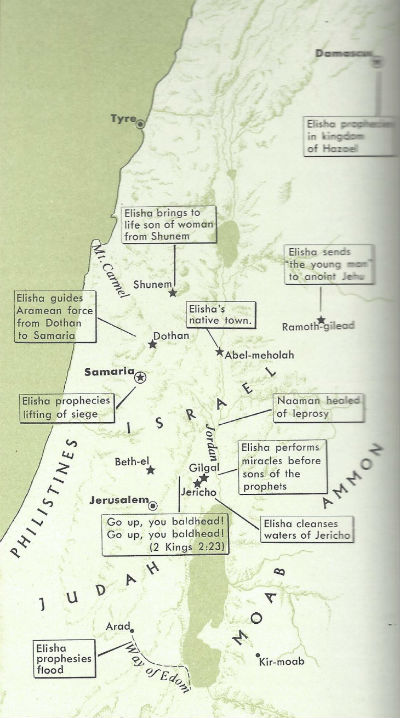Elisha: A Prophet for Hard Times!
By Neil Earle
 Widow's Oil – A miracle for the little people in Israel.
Widow's Oil – A miracle for the little people in Israel.After the departure of the fiery Elijah from Israel’s history his apprentice Elisha gained access to twice the endowment of the Holy Spirit as his mentor. You can read this in the book of Second Kings, Chapter Two.
Elisha arrived on the scene just in time – a time of economic hardship, terrorist bands and marauding armies made it a time of crisis. Elisha has been called the Prophet of Grace. His many miracles are leavened with aid and comfort from the Almighty to the downtrodden in the land and resembled Jesus’s relations with the common people (Mark 1:45). 2 Kings has the story, and a great one it is.
The Miracle-Worker
Elisha healed the poison spring that supplied water to the crucial city of Jericho. Water was a priceless commodity in Israel even today and in this case the prophet reversed a curse placed there centuries before by Joshua himself (2 Kings 2:21-22). (The spring is still there.) This was prophetic of what Elisha would do – reversing curses and pointing towards the Greater One who would remove the curse on the whole world (Galatians 3:13). Very early we see how Elisha’s life is a template for the God of justice and lovingkindness revealed in Jesus (Luke 4:1-5).
Elisha is just getting started. He blessed a devout widow with enough oil to provide for her own needs and to set herself up as a small entrepreneur. He prayed for another widow who was childless and interceded after the boy had died, apparently working a resurrection! Elisha rescued a sunken axe head by making it float upon the water. He anticipated Jesus’ miracle of the feeding of the 5000 by multiplying meager supplies and turning them into a feast for 100 onlookers.
More was to follow. He supernaturally blinded a Syrian army sent to capture him in Samaria and made sure his personal prisoners were treated well by the King of Israel, showing that nations that eat together can be at peace together (2 Kings 6). On the international front he healed a proud warrior named Naaman the Syrian, again anticipating Jesus who praised a Roman officer for his faith.
In short, if Elijah was the tough and uncompromising forerunner of John the Baptist who lived in the desert in animal skins, Elisha was a foreshadowing of Jesus whose ministry was often to the meek, the downtrodden, the out of luck.
No doubt we could use someone of Elisha’s temperament today when wealth disparities are the stuff of our nightly news and international crises are a regular occurrence.
What were some of the keys to Elisha’s success? What was it that made him such a channel for God’s Spirit of power to work through? There are at least five aspects of his temperament and career that can inspire us today.
 The activities of Elisha, 9th century B.C. Elisha was not in one place for long.
The activities of Elisha, 9th century B.C. Elisha was not in one place for long.The Man Who Knew His Mind
First, Elisha was humble. Though from a well-off family – his father had twelve yoke of oxen (1 Kings 19:19) – he lived up to his name “God is Savior.” He respected God’s authority in the prophet Elijah, his mentor. “I will not leave you,” Elisha said to his master as they traversed Israel for Elijah’s dramatic exit in a whirlwind at the Jordan. A whole body of young apprentice-prophets sought to deter him from his intention but Elisha held firm (2:3). His sincere affection for Elijah is indicated by his outcry “My father! My father!” when Elijah departed in a chariot of fire. Elisha had meant what he said when he accepted Elijah’s call. He had learned what all servants of God must learn: we have to die to Self if God is to be served effectively.
As we bend down in humility God picks us up for service.
Second, and linked to number one, Elisha felt the need of God’s Spirit. He asked Elijah for a double portion of the Spirit and sure enough the request was granted – Elisha did double the miracles of Elijah. More, in fact, than any prophet in Israel’s history.
Third, Elisha had a tender heart. He supernaturally sees a woman coming to him bowed down in spirit and sends his servant to enquire of her need. Servants of God can easily get jaded and discouraged by the numerous people and incidents they encounter. Not so with Elisha. He listens to his students worried about losing a borrowed axe head, he has a heart for widows and deprived people, he will not let the Israelites massacre a Syrian army he had struck blind (6:18), he weeps over the destruction to fall on some of his own people, he has time on his death-bed for a king with a brutal ancestry.
Faithful Unto Death…and After
Fourth, Elisha could motivate and train others. In part this was due to his tender spirit. Elisha, like Jesus, weeps. Elijah never weeps. This is an attractive quality in a leader. The “sons of the prophets” – probably ministers in training – begin to increase under his example and leadership (6:1). He regularly sent his assistant to announce good news and prophetic updates to those who came to him just as Jesus sent out the 70 and empowered them.
Fifth, Elisha served God in old age and sickness. Usefulness in later years is a blessing from God (Psalm 92:14). When Elisha finally expires from a sickness his dead bones are used to revive another corpse thrown into the same grave. Elijah departed in majesty and splendor; Elisha fades away gradually but in 2 Kings 13:20-21 God sets the final seal of approval on the prophet’s life. Even his dead bones can give life, just as Jesus reconciled us to the Father through his death on the cross. As Arthur Pink concluded: “Thus, to the end, miracles are connected with the mission of Elisha.”
Think of it! A posthumous miracle, and one which points to a revival of Israel as a nation in the years after the prophet’s death – and God’s delivering his people from death. Indeed, this man Elisha cast a long shadow. No wonder Christ the Lord spoke of his career with praise and affection (Luke 4:27). Thanks be to God for Elisha’s magnificent service to God and man and the record that inspires us to stay faithful.